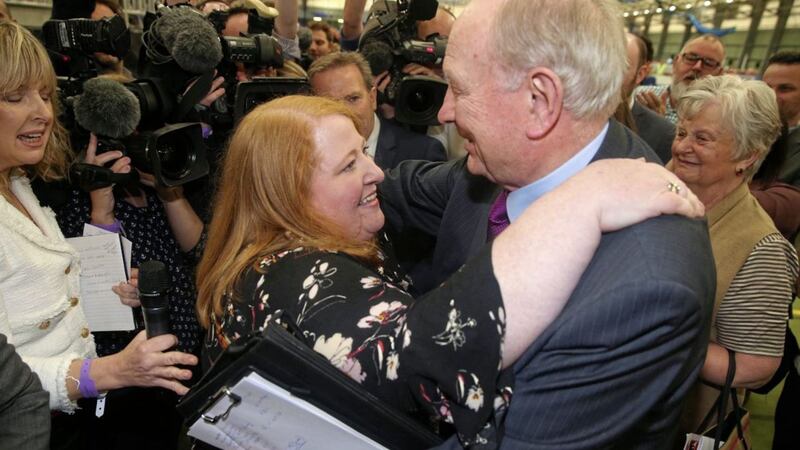Is it too early to say that Alliance's success has changed the shape and face of Northern Ireland politics?
The unionist/nationalist blocs still account for about 80 per cent of those who voted at the last two elections. Yet the success has clearly changed the shape and face of the Alliance party itself. It can no longer be dismissed as a 'waste of a vote party.' When you leap from 7 per cent to almost 12 per cent, and then leap again to over 18 per cent (and around 20,000 or so votes behind the DUP and Sinn Féin) it is clear that something very big, very significant is happening.
But it's also worth remembering that Alliance has been here before. In its first four local elections - between 1973 and 1977 - it averaged almost 12 per cent and 76,000 votes, statistics it hasn't come close to matching for 40 years. Back then it was viewed by some and feared by others as the party that would change Northern Ireland. It didn't. So, will anything be different this time?
Two things seem to have played in the party's favour: Brexit and a non-functioning Assembly. Alliance was the perfect party for those who wanted to register a protest of some sort. It may also have benefited from the anger and sense of helplessness which followed the death of Lyra McKee. It was also a home for Remain unionists. A point I made over and over again during the Euro campaign was that unionist Remainers were unlikely to vote for a Leave unionist party, even when the DUP/UUP/TUV/Ukip/Conservatives (although Sinn Féin were doing the same thing as well, albeit for different reasons) were trying to turn it into a referendum on a border poll.
They voted Alliance, instead, precisely because they wanted to record their support for the EU. The UK union will still matter to them, of course; and they would probably still vote for it if there were a border poll. But that's an issue and a battle for another day and another vote. Naomi Long recognised the dilemma facing Remain unionists and pitched directly to them, without any of the ambiguity which hovered over the UUP's position.
Which brings us to the key question for Alliance: can it hold on to these new votes at the next general and Assembly elections? If it can, then it means that there will, inevitably, be a change in how politics is done here. And it is a change which will do electoral damage to both the DUP and Sinn Féin, in the way that it seems to have done damage already to the UUP and SDLP.
The challenge it faces is to convince enough people - most of whom are already voting for other parties, or not voting at all - that it's okay to prioritise everyday issues and make power-sharing work rather than just dragging everything back to the constitutional question.
But here's their problem: the DUP and Sinn Féin have always found it easier to fight pitch battles around the issue of who is allowed to describe themselves as first minister (a title that seems to matter more to them for psychological/propaganda reasons than for any specific or magical powers it invests in the office holder). That single pitch also makes it much easier to rally the troops in election after election, allowing the middle ground to be squeezed repeatedly.
Neither the DUP nor Sinn Féin wants Alliance to keep on growing, because a growing Alliance expands the middle ground and may also encourage the growth of other new or already existing smaller parties. That mucks about with their stats. The DUP adds SF/SDLP/'other' votes together and focuses on the outcome of a possible border poll. Sinn Féin adds DUP/UUP/TUV/'others' together and focuses on the outcome of the same border poll. Anything that lessens the prospect or 'fear' of a border poll means that the DUP and Sinn Féin will have to reconsider how they do politics.
I wonder if, maybe, just maybe, the rise of Alliance will encourage Foster and O'Neill to get the Assembly up and running again? Alliance benefited from a get-Stormont-working-again protest vote in the council elections (adding 30,000 votes to their previous tally) and then, with the wind at their back, added another 35,000 last week. The momentum is with the party right now, so how much more could it grow if there were early general and Assembly elections? In other words, maybe the best way to stop Alliance's growth is for the DUP and Sinn Féin to get their act together, reach a few unexpected compromises, reboot the Executive and Assembly and start reaping the benefits of positive cooperation and publicity?
And wouldn't that be a staggering irony: the breaking of the ongoing DUP/Sinn Féin impasse because both of them actually fear the growth and expansion of the middle ground?








